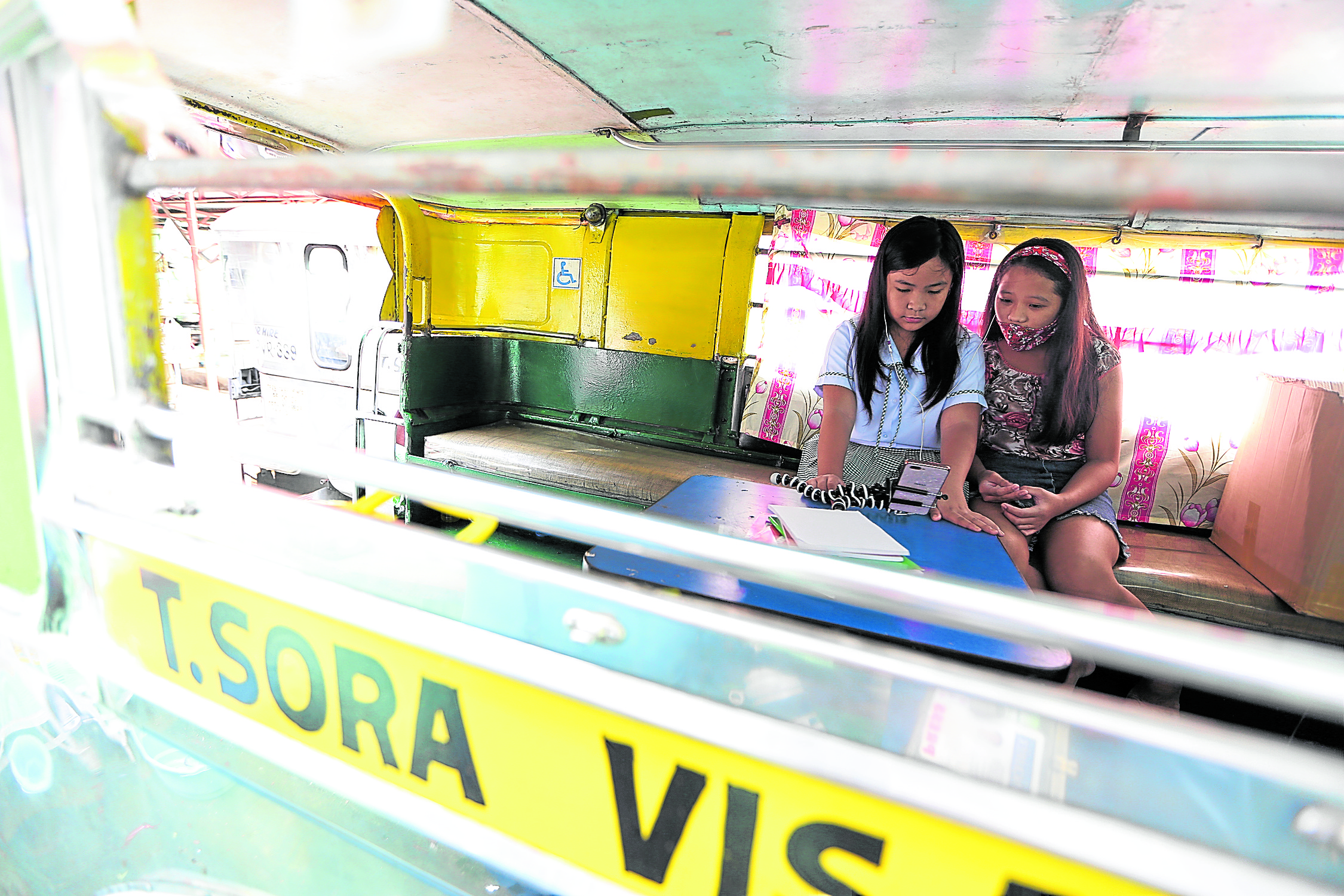Study weighs pandemic toll on students’ mental health

JEEPNEY CLASS Cousins Bea Joy Roxas (in uniform) and Elrich Joy Andres, attend their online class in a passenger jeepney that also serves as their home at Tandang Sora in Quezon City. —NINO JESUS ORBETA
The pandemic has taken a heavy toll on the mental health of college students, particularly those from poor households who worried more about tuition, gadgets, internet reliability, as well as future job prospects compared to their more affluent peers, according to a research by Phinma Education network.
“The lower the income class, the higher the number of respondents experiencing a significant degree of loneliness, anxiety and stress,” Phinma Education said in a December 2021 paper prepared by its analytics groups. “This is because their income status and household earnings were directly tied to their capability to continue their education.”
As part of the research, titled “Managing the impact of the COVID-19 pandemic on college retention: the Phinma experience,” the group conducted two surveys among tertiary students in its nationwide network age 19 to 23 from different socioeconomic classes.
Uncertainty
The first nationwide survey was conducted in May 2020, with 713 respondents, while the next survey was conducted in June 2021, with 7,775 respondents across all income classes.
The research showed that while everyone had been affected by the pandemic, those from lower-income households had been “more gravely” affected.
Article continues after this advertisementPhinma Education, composed of nine secondary and tertiary educational institutions around the country, also found that the financial situation of their households affected the psychological well-being of the students, with those from lower-income classes concerned about funds to cover the cost of enrollment and adjusting to distance learning.
Article continues after this advertisement“The financial situation of the household is tied to the students’ psychological well-being during the pandemic. It may be observed that the prevalence of loneliness, anxiety and stress increased across socioeconomic classes. Their concerns were linked to household expenses such as medical; services for sick family members, sufficient household incomes and cost of enrollment and distance learning,” it noted.
Loneliness, anxiety, stress
But those experiencing loneliness, anxiety, and stress increased across all income segments. According to Phinma, students from higher income classes have the gadgets and adequate space for learning, while those in lower income classes may suffer from little to no technological resources and an environment that is not conducive to learning: cramped spaces, poor lighting and ventilation as well as noisy neighborhoods.
“Adding to the mental distress is the high level of uncertainty on how the pandemic will impact their preparedness for employment. Students may become distracted or unmotivated because of an uncertain, rapidly changing future,” it added.
90% retention rate
Phinma, however, reported a student retention rate of 90 percent across its school network as it offered scholarships and adjusted learning modalities. Amid limitations in internet accessibility and bandwidth, Phinma chose not to implement a full online model.
To support online classes, the school operator provided gadgets and learning materials to students, nurtured a supportive community among students and teachers, and offered free counseling sessions. These helped learners process their stress and anxiety, and contributed to improving their mental health, the paper noted.
Across classes
Because of the negative impact of the pandemic on household incomes, Phinma had braced for risks that some students may drop out. Based on its research, more than 56 percent worried that they would not have enough money to enroll while 63 percent worried about their internet connection.
The paper noted that 53 percent of the respondents from class E and 47 percent of those from class D experienced loneliness during this pandemic, compared to 39 percent from class AB and 42 percent from class C.
About 50 percent of class E also experienced anxiety compared to 36 percent from class AB, 40 percent from class C and 44 percent from class D.
However, stress levels exceeded 50 percent of respondents across all income classes, broken down as follows: 52 percent for AB, 53 percent for C, 54 percent for D, and 57 percent for E.
Enrollment
Across the Phinma Network, there was a 3-percent drop in enrollment from 74,187 students in school year 2019-2020 to 71,659 in school year 2020-2021.
Schools in the country stopped in-person classes shortly after the pandemic was declared in March 2020.
In November last year, a hundred public schools in the provinces and 20 private schools from different regions started the pilot run of limited in-person classes, making the Philippines the last country in the world to do so.
But the return of stricter restrictions due to postholiday spikes in COVID-19 cases has again put those classes on hold. —With a report from Inquirer Research